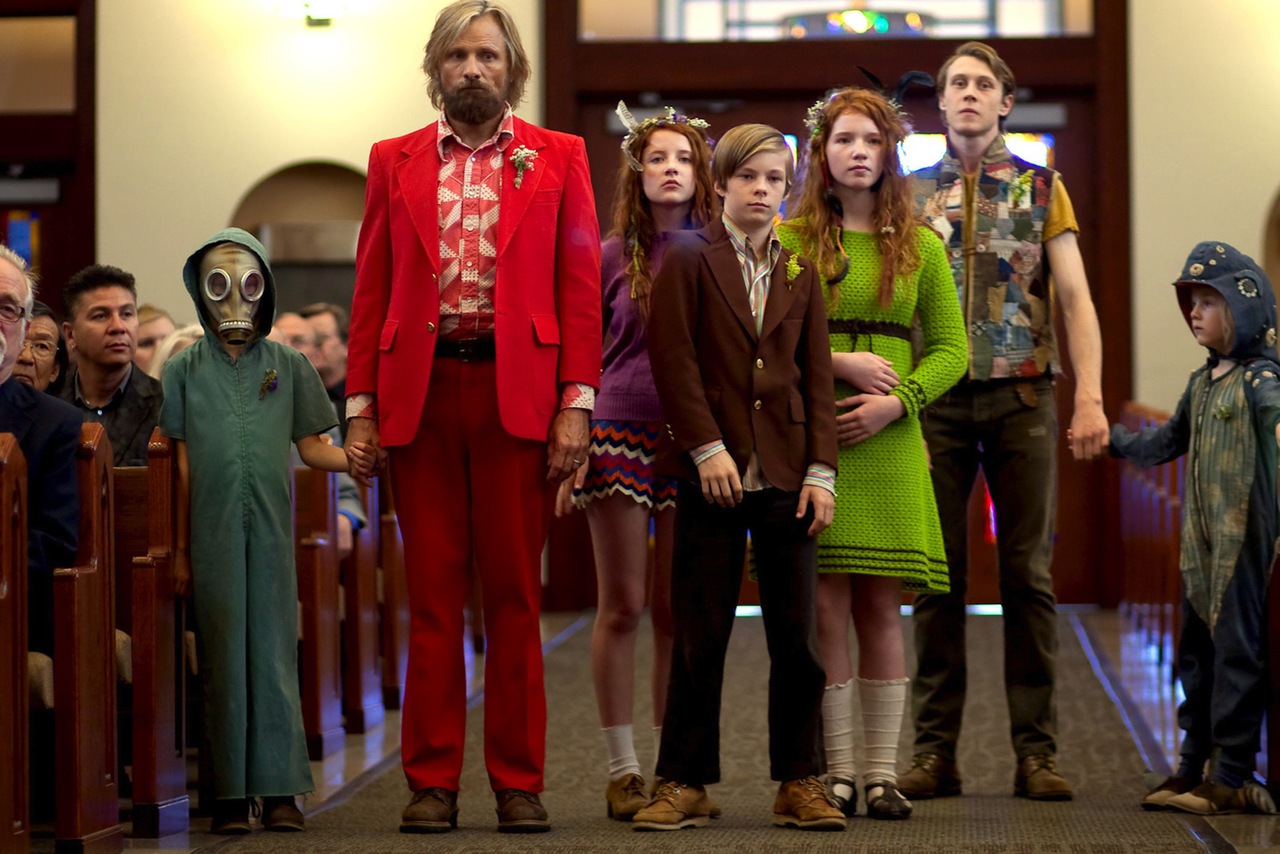
MPAA Rating: R | Rating: ★★★
Release year: 2016
Genre: Comedy, Drama Director: Matt Ross
The other day I was driving home with my family from a Christmas tree farm. Having found our tree, we were on the winding rural roads, surrounded by the green-and-grey of the Pacific Northwest, trees and rivers and mountains and life. It was one of those familial moments which are entirely ordinary, yet somehow seemed infused with significance and beauty, a road trip where We Were Together and all was right with the world. It felt borderline escapist, a respite from the madness of our political and economic climate.
Road trips and escapism are essential ingredients in Matt Ross’ familial comedy-drama Captain Fantastic, a film which explores family identity and the ties that both bind and break us. Ben (Viggo Mortensen) is wholly devoted to the training of his six children. Having moved the family into the forests of the Pacific Northwest, the kids are given an intense physical and intellectual regimen, from learning how to hunt and skin a deer to reading philosophy and classic literature (mostly socialist ideals). It’s the epitome of a liberal/progressive education, as Ben and his wife Leslie are devoted to living out their ideals in this self-made utopia. When Leslie commits suicide, Ben and his kids embark on a journey to New Mexico for the funeral, a journey which will challenge both their ideals and their familial bonds.
Captain Fantastic has a brilliant color palette–the filmmakers must have used a filter or lens to create a lush, vibrant film. Combining this brightness with the soundtrack and well-crafted performances (especially from the kids within the family), the film’s darker, sadder elements still retain a sort of comedic vibe. The film is in the same vein as Little Miss Sunshine, a family road trip film with a quirky/indie sentiment, where everyone learns valuable lessons as their worldviews are challenged by outsiders. It even ends with a somewhat silly song-and-dance, just like LMS.
It’s interesting to me that Ben and his family celebrate critical thinking and progressive ideas, yet are essentially dismissive of both their extended family as well as society at large. It’s elitism at its most subtle and vicious, a sort of intellectual snobbery which blinds the “critical thinker” to the humanity of the Other. They’re open to ideas, but only to a point. Ben remarks to his kids that they aren’t to make fun of anyone. “Except for Christians,” one of his kids quips. It’s a moment of humor, but it also betrays the deep-rooted cynicism Ben and Leslie have fostered in their kids–in their attempts to free their children from the shackles of Western culture, they’ve enslaved their children to a myopic self-created vision disconnected from tradition or community. The film vilifies the ignorant American relatives (Steve Zahn and Kathryn Hahn) and the wealthy Christian grandparents (Frank Langella and Ann Dowd), and while it doesn’t let Ben off the hook for his extreme behaviors and principles, it also ultimately doesn’t result in reconciliation or mutual understanding. According to the film, even when Ben is in the wrong, he’s still more right than these folks. This celebration of critical thinking and liberality while also missing the essential relational elements of humanity felt like pointing out a speck while missing the plank.
I keep thinking back to that little moment in the car with my own family. Like Viggo’s Ben, I am a father who just wants to do what’s best for my kids, to prepare them for the world, to challenge them to think critically, to read well, to care for themselves and others, and to embody countercultural values. Where these values for Ben lie in progressive ideals and Noam Chomsky, mine lie in the kingdom of God and the person of Jesus Christ. Am I as entrenched as Ben? Am I willing to be open to others? How am I equipping my children to both be able to engage with their surrounding world while also keeping them unstained by its brokenness? Captain Fantastic raises some interesting ideas and questions about family identity and methods for raising children, and while I felt it didn’t adequately address some of its protagonists’ deeper issues, it ultimately is a worthy conversation-starter.
IMDB Listing: http://www.imdb.com/title/tt3553976/